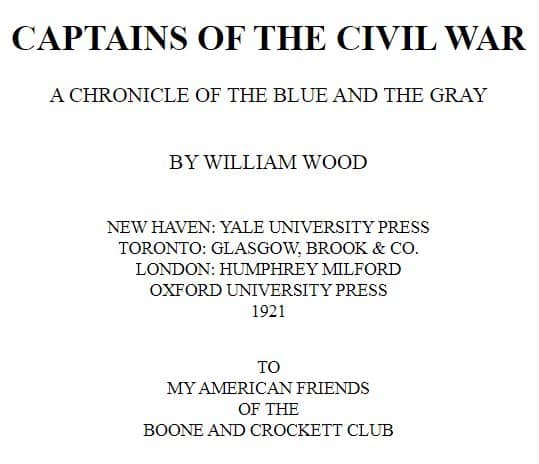‘Captains Of The Civil War’ PDF Quick download link is given at the bottom of this article. You can see the PDF demo, size of the PDF, page numbers, and direct download Free PDF of ‘Captains of The Civil War’ using the download button.
Captains Of The Civil War By William Wood PDF Free Download

THE CLASH: 1861
States which claimed a sovereign right to secede from the Union naturally claimed the corresponding right to resume possession of all the land they had ceded to that Union’s Government for the use of its naval and military posts.
So South Carolina, after leading the way to secession on December 20, 1860, at once began to work for the retrocession of the forts defending her famous cotton port of Charleston.
These defenses, being of vital consequence to both sides, were soon to attract the strained attention of the whole country.
There were three minor forts: Castle Pinckney, dozing away, in charge of a solitary sergeant, on an island less than a mile from the city; Fort Moultrie, feebly garrisoned and completely at the mercy of attackers on its landward side; and Fort Johnson over on James Island.
Lastly, there was the world-renowned Fort Sumter, which then stood, unfinished and ungarrisoned, on a little islet beside the main ship channel, at the entrance to the harbor, and facing Fort Moultrie just a mile away.
The proper war garrison of all the forts should have been over a thousand men.
The actual garrison—including officers, band, and the Castle Pinckney sergeant—was less than a hundred.
It was, however, loyal to the Union; and its commandant, Major Robert Anderson, though born in the slave-owning state of Kentucky, was determined to fight.
The situation, here as elsewhere, was complicated by Floyd, President Buchanan’s Secretary of War, soon to be forced out of office on a charge of misapplying public funds.
Floyd, as an ardent Southerner, was using the last lax days of the Buchanan Government to get the army posts ready for capitulation whenever secession should have become an accomplished fact.
He urged on construction, repairs, and armament at Charleston, while refusing to strengthen the garrison, in order, as he said, not to provoke Carolina.
Moreover, in November he had replaced old Colonel Gardner, a Northern veteran of “1812,” by Anderson the Southerner, in whom he hoped to find a good capitulator. But this time Floyd was wrong.
The day after Christmas Anderson’s little garrison at Fort Moultrie slipped over to Fort Sumter under cover of the dark, quietly removed Floyd’s workmen, who were mostly Baltimore Secessionists, and began to prepare for defense.
The next morning Charleston was furious and began to prepare for an attack.
The South Carolina authorities at once took formal possession of Pinckney and Moultrie, and three days later seized the United States Arsenal in Charleston itself.
Ten days later again, on January 9, 1861, the Star of the West, a merchant vessel coming in with reinforcements and supplies for Anderson, was fired on and forced to turn back.
Anderson, who had expected a man-of-war, would not fire in her defense, partly because he still hoped there might yet be peace.
But when the raiders reached it on the eighteenth they found it abandoned and its Arsenal in flames.
The machine shops, however, were saved, as well as the metal parts of twenty thousand stand of arms.
Then the Virginia militiamen and volunteers streamed in, to the number of over four thousand. They were a mere conglomeration of semi-independent units, mostly composed of raw recruits under oflacers who themselves knew next to nothing.
As usual with such fledgling troops there was no end to the fuss and feathers among the members of the busybody staffs, who were numerous enough to manage an army but clumsy enough to spoil a platoon.
It was said, and not without good reason, that there was as much gold lace at Harper’s Ferry, when the sun was shining, as at a grand review in Paris.
Into this gaudy assemblage rode Thomas Jonathan Jackson, mounted on Little Sorrel, a horse as unpretentious as himself, and dressed in his faded old blue professor’s uniform without one gleam of gold.
He had only two staff oflScers, both dressed as plainly as himself.
He was not a major-general, nor even a brigadier; just a colonel. He held no trumpeting reviews. He made no flowery speeches. He didn’t even swear.
| Author | William Wood |
| Language | English |
| No. of Pages | 478 |
| PDF Size | 18 MB |
| Category | Education |
| Source/ Credits | archive.org |
Captains Of The Civil War PDF Free Download
